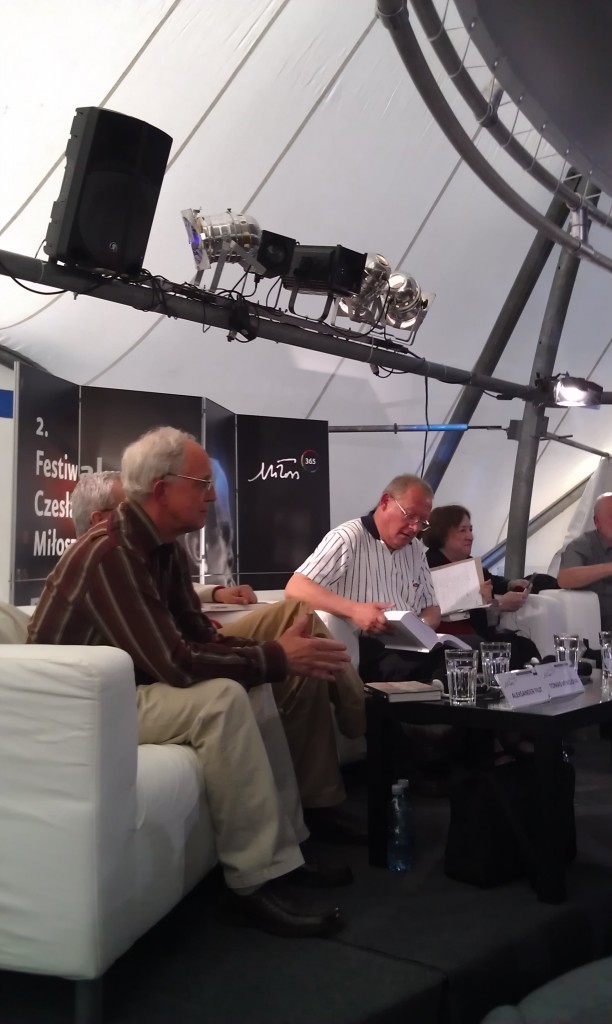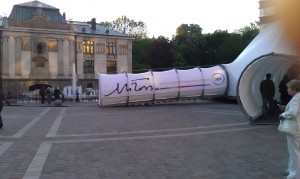Jane Hirshfield recalls that Czesław Miłosz lived in a “storybook” cottage on Grizzly Peak in the hills of Berkeley. But to describe the fairy tale that took place within the cottage, you’d need a new character, a new story – “The Wolf Who Ate Books,” she suggested.
In the elegant and newly revamped Szczepanski Square, the Miłosz Pavilion – a strange, science fiction-y formation of hemispherical tents and tunnels – hosted a range of activities during the Czesław Miłosz centenary festival. One spotlighted reminiscences with, as well as Jane, scholar Aleksander Fiut, Gazeta Wyborcza editor Adam Michnik, poet Tomas Venclova, leading critic Helen Vendler, and poet Adam Zagajewski. As with so many of the events, Znak publisher Jerzy Illg hosted. Here are a few of their memories:
Michnik recalled Miłosz trying to meet him at a very particular Bulgarian restaurant in Paris, where Miłosz spent the lonely, tormented decade following his lonely defection from Communist Poland. “Then Miłosz said a sentence I would remember for the rest of my life: ‘I wanted to meet you here, because here, in the 1950s, very often I kept feeling I would commit suicide,'” he confided to his friend. Michnik recalled his famous essay of the time, “Nie” [No], where he explained his defection to the world. It opened: “What I’m going to tell now could well be called a story of a suicide…”
He also remembered Miłosz’s triumphant return to Poland in 1981, with the heady rise of Solidarity. “It was a time of euphoria, carnival – it was our victory,” he said.
Miłosz was more cautious. He told Michnik, “The atmosphere feels like just before the Warsaw Uprising. Please be careful.” Tanks rolled into Warsaw and martial law was declared a few months later.
Tomas Venclova recalled when Stanisław Lem was rumored to be up for the Nobel prize. “I don’t care about the Nobel prize,” Miłosz told him, “but if any other writer gets it, I wouldn’t be too happy.”
Aleksander Fiut traveled with Miłosz to Stockholm for the 1980 Nobel. On the way to the event, in a chauffeur-driven limousine, Miłosz was hungry. Where did they stop? He told the chauffeur to pull into McDonald’s. “Her facial muscles didn’t even move,” Fiut recalled.
Jerzy Illg recalls the poet at 90, looking deeply into a vodka and a piece of herring – two of his favorite things. “Happiness is accessible,” he declared finally. Illg had him write that down and sign it. “It’s a valuable security paper I hold,” Jerzy reflected.
Jane met both Carol and Czesław at a Bay Area picnic, where the hostess urged her beforehand to chat with the Miłoszes, since many were too intimidated to be social. So, unfortunately, was Jane. It was as if, she said, she had been told, “Please go talk to Yeats. Please go talk to Shakespeare.”
Jane also recalled the death of Miłosz’s much-younger wife Carol, in 2002. At the memorial service in Berkeley, she remembers Miłosz sitting erect, “evidence of decades of unbearable loss being carried.” She spoke to him afterward, and “for three seconds he completely broke down.”
“I never held a grief that large in my arms,” she said.
Tags: Adam Michnik, Adam Zagajewski, Aleksander Fiut, Helen Vendler, Jane Hirshfield, Tomas Venclova




March 26th, 2015 at 5:17 am
I can never read enough about Milosz, my hero. Through him I was introduced to the wonderful world of poetry after I developed a muscular disease and had to quit running at the age of 70. I am a 87 year old retired lawyer and read some poetry daily. I also write a little. For me, poetry has to be mostly intelligible, celebrate existence and have some sense of the transcendent. I have four shelves of poetry, much of which I don’t enjoy as being bereft of my above required parameters. Poets like Milosz and Zagajewski (whom I consider his heir) I read and re-read. I have studied theology and philosophy and have discovered that poetry ranks along with these disciplines at an exulted level. What a gift it has been for me in my infirmity and my great age. Milosz was unquestionably a genius with a piercing insight into reality and the human condition. I am suffused with gratitude.
April 25th, 2015 at 8:32 am
Me too, Ernie. Welcome to the Book Haven!